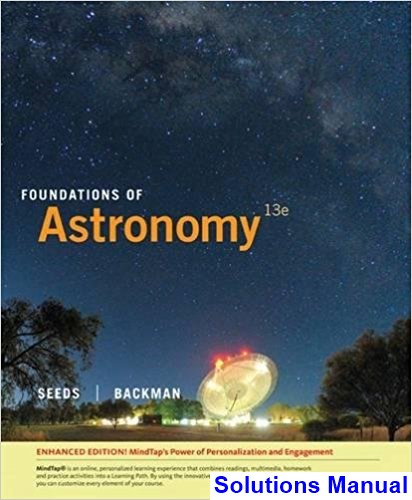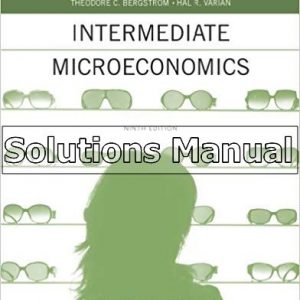This is completed downloadable of Foundations of Astronomy Enhanced 13th Edition Seeds Solutions Manual

Product Details:
- ISBN-10 : 1305079159
- ISBN-13 : 978-1305079151
- Author:
Fascinating, engaging, and extremely visual, FOUNDATIONS OF ASTRONOMY, Thirteenth Edition, is renowned for its current coverage, reader-friendly presentation, and detailed, yet clear explanations. The authors’ goals are to help you use astronomy to understand science–and use science to answer two fundamental questions: What are we? And how do we know?
Table of Content:
- Ch 1: Here and Now
- 1-1: Where are You?
- 1-2: When is Now?
- 1-3: Why Study Astronomy?
- Study and Review
- Ch 2: A User’s Guide to the Sky
- 2-1: Stars and Constellations
- 2-2: The Sky and Celestial Motions
- 2-3: Sun and Planets
- 2-4: Astronomical Influences on Earth’s Climate
- Study and Review
- Ch 3: Moon Phases and Eclipses
- 3-1: The Changeable Moon
- 3-2: Lunar Eclipses
- 3-3: Solar Eclipses
- 3-4: Predicting Eclipses
- Study and Review
- Ch 4: Origins of Modern Astronomy
- 4-1: Roots of Astronomy
- 4-2: The Copernican Revolution
- 4-3: Tycho, Kepler, and Planetary Motion
- 4-4: Galileo Finds Conclusive Evidence
- 4-5: Ninety-Nine Years That Revolutionized Astronomy
- Study and Review
- Ch 5: Gravity
- 5-1: Galileo’s and Newton’s Two New Sciences
- 5-2: Orbital Motion and Tides
- 5-3: Einstein and Relativity
- Study and Review
- Ch 6: Light and Telescopes
- 6-1: Radiation: Information from Space
- 6-2: Telescopes
- 6-3: Observatories on Earth: Optical and Radio
- 6-4: Airborne and Space Observatories
- 6-5: Astronomical Instruments and Techniques
- 6-6: Non-Electromagnetic Astronomy
- Study and Review
- Ch 7: Atoms and Spectra
- 7-1: Atoms
- 7-2: Interactions of Light and Matter
- 7-3: Understanding Spectra
- Study and Review
- Ch 8: The Sun
- 8-1: The Solar Photosphere and Atmosphere
- 8-2: Solar Activity
- 8-3: Nuclear Fusion in the Sun
- Study and Review
- Ch 9: The Family of Stars
- 9-1: Star Distances
- 9-2: Apparent Brightness, Intrinsic Brightness, and Luminosity
- 9-3: Stellar Spectra
- 9-4: Star Sizes
- 9-5: Star Masses-Binary Stars
- 9-6: A Census of the Stars
- Study and Review
- Ch 10: The Interstellar Medium
- 10-1: Studying the Interstellar Medium
- 10-2: Components of the Interstellar Medium
- 10-3: The Gas-Stars-Gas Cycle
- Study and Review
- Ch 11: The Formation and Structure of Stars
- 11-1: Making Stars from the Interstellar Medium
- 11-2: The Orion Nebula: Evidence of Star Formation
- 11-3: Young Stellar Objects and Protostellar Disks
- 11-4: Stellar Structure
- 11-5: The Source of Stellar Energy
- Study and Review
- Ch 12: Stellar Evolution
- 12-1: Main-Sequence Stars
- 12-2: Post-Main-Sequence Evolution
- 12-3: Star Clusters: Evidence of Stellar Evolution
- 12-4: Variable Stars: Evidence of Stellar Evolution
- Study and Review
- Ch 13: The Deaths of Stars
- 13-1: Low-Mass Stars
- 13-2: The Evolution of Binary Stars
- 13-3: High-Mass Stars
- 13-4: Observations of Supernovae
- 13-5: The End of Earth
- Study and Review
- Ch 14: Neutron Stars and Black Holes
- 14-1: Neutron Stars
- 14-2: Black Holes
- 14-3: Compact Objects with Disks and Jets
- Study and Review
- Ch 15: The Milky Way Galaxy
- 15-1: Discovery of the Galaxy
- 15-2: Structure of the Galaxy
- 15-3: Spiral Arms and Star Formation
- 15-4: The Nucleus of the Galaxy
- 15-5: Origin and History of the Milky Way Galaxy
- Study and Review
- Ch 16: Galaxies
- 16-1: The Family of Galaxies
- 16-2: Measuring the Properties of Galaxies
- 16-3: Evolution of Galaxies
- Study and Review
- Ch 17: Active Galaxies and Supermassive Black Holes
- 17-1: Active Galactic Nuclei
- 17-2: Supermassive Black Holes
- 17-3: A History of Galaxies and Supermassive Black Holes
- Study and Review
- Ch 18: Modern Cosmology
- 18-1: Introduction to the Universe
- 18-2: The Big Bang Theory
- 18-3: Space and Time, Matter and Gravity
- 18-4: 21st-Century Cosmology
- Study and Review
- Ch 19: Origin of the Solar System and Extrasolar Planets
- 19-1: A Survey of the Solar System
- 19-2: The Great Chain of Origins
- 19-3: Building Planets
- 19-4: Planets Orbiting Other Stars
- Study and Review
- Ch 20: Earth: The Active Planet
- 20-1: A Travel Guide to the Terrestrial Planets
- 20-2: Earth as a Planet
- 20-3: The Solid Earth
- 20-4: Earth’s Atmosphere
- Study and Review
- Ch 21: The Moon and Mercury: Comparing Airless Worlds
- 21-1: The Moon
- 21-2: Mercury
- Study and Review
- Ch 22: Venus and Mars
- 22-1: Venus
- 22-2: Mars
- 22-3: Mars’s Moons
- Study and Review
- Ch 23: Jupiter and Saturn
- 23-1: A Travel Guide to the Outer Solar System
- 23-2: Jupiter
- 23-3: Jupiter’s Moons and Rings
- 23-4: Saturn
- 23-5: Saturn’s Moons and Rings
- Study and Review
- Ch 24: Uranus, Neptune, and the Kuiper Belt
- 24-1: Uranus
- 24-2: Neptune
- 24-3: Pluto and the Kuiper Belt
- Study and Review
- Ch 25: Meteorites, Asteroids, and Comets
- 25-1: Meteorites, Meteors, and Meteoroids
- 25-2: Asteroids
- 25-3: Comets
- 25-4: Asteroid and Comet Impacts
- Study and Review
- Ch 26: Astrobiology: Life on Other Worlds
- 26-1: The Nature of Life
- 26-2: Life in the Universe
- 26-3: Intelligent Life in the Universe
- Study and Review
- Afterword
- Appendix A: Units and Astronomical Data
- Appendix B: Observing the Sky
- Answers to Even-Numbered Problems
- Glossary
- Index





